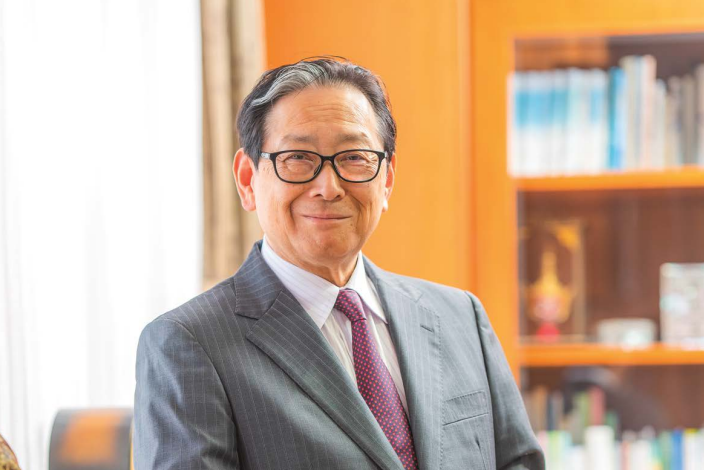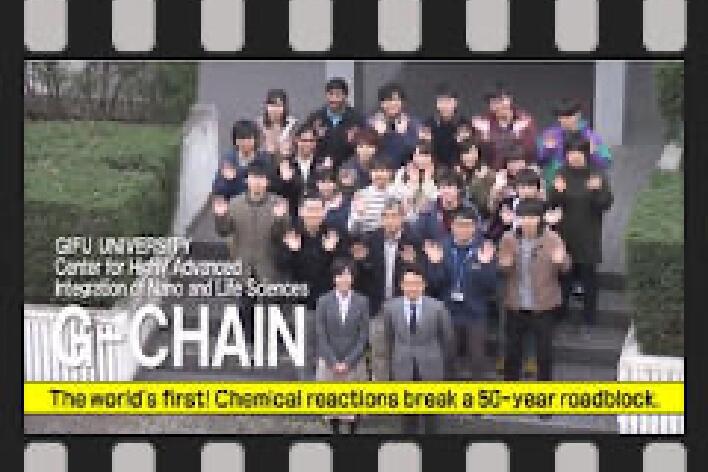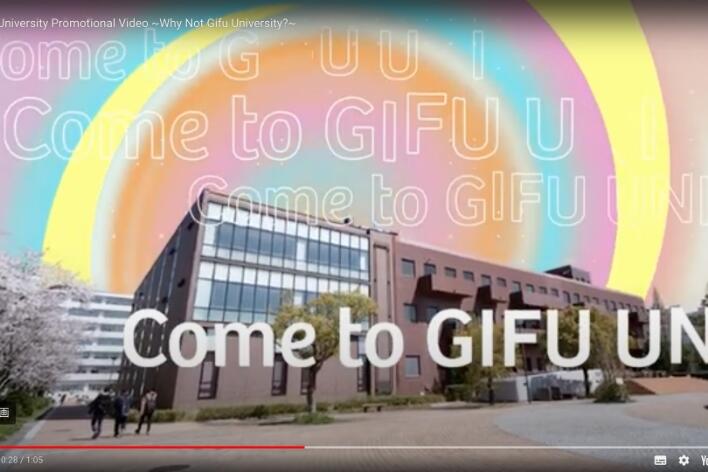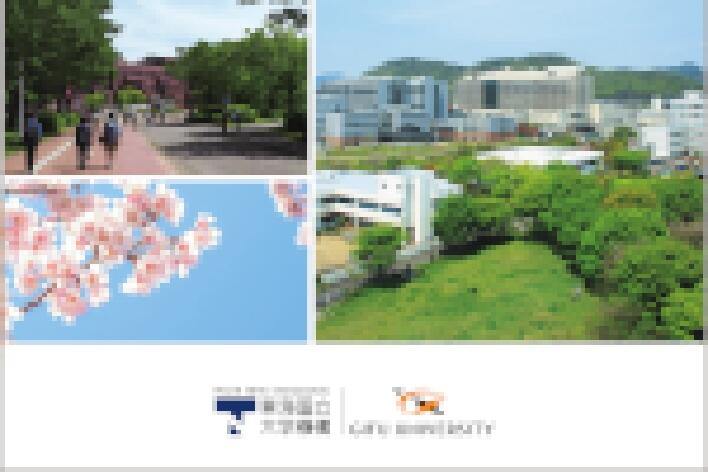Joint Degree Program Activities
*Information related to faculty members/students and graduate schools at Gifu University here are all that of the time of interviewing.
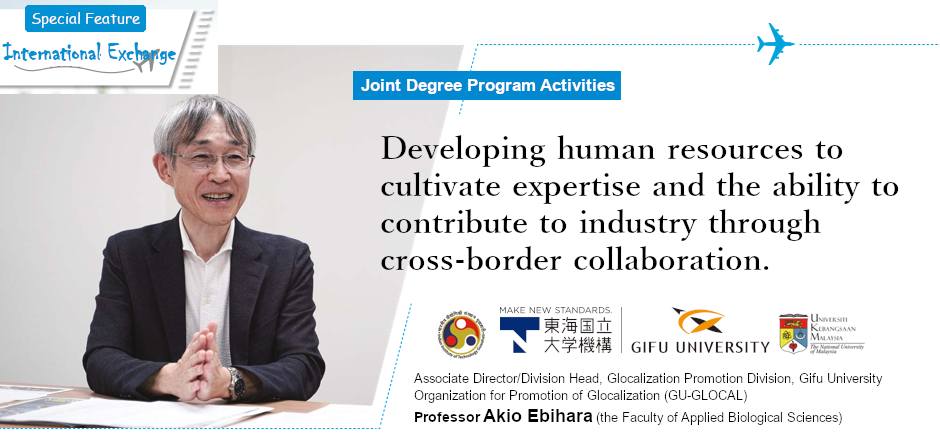
Obtaining a joint degree from Gifu University and its partner universities overseas

I have been interacting with Indian University teachers through research for some time, and the topic of 'How can we develop human resources that contribute to the industries of both countries?' has often come up. One solution we introduced is the Joint Degree Program (JDP) system, established by the Ministry of Education, Culture, Sports, Science and Technology (MEXT) in 2014.
The Joint Degree Program (JDP) is a program that allows students to obtain a degree jointly awarded by two universities, one in Japan and one overseas. Japanese and overseas universities collaborate to create a single program, in which students are enrolled at both universities to experience studying abroad at the partner university. Although the duration of study at each university may differ, the curriculum is the same, and the period of completion, number of credits, and tuition fees are comparable to those of domestic graduate schools. Currently, Gifu University has established four JDPs for master's and doctoral degrees with the Indian Institute of Technology Guwahati (IITG, India) and the National University of Malaysia (UKM, Malaysia) (see the diagram below). Under the framework of Gifu University's JDP, the "Glocal JDP Platform" contributing to international collaborative education was established through the utilization of the "JDP Consortium," an academia-industry-government-banking collaborative consortium comprising approximately 90 member companies. We also receive cooperation in human resource development, such as accepting foreign students for internships at consortium member companies.

Study Group (at Gifu University)
Out of the 30 JDPs available at universities nationwide, the Tokai National Higher Education and Research System (THERS), comprised of Gifu University and Nagoya University, contributes significantly with a total of 11 being implemented in Japan. Therefore, THERS proposed the establishment of the 'Interuniversity JDP Council of Japan.' Gifu University serves as the chair university, acting as a liaison for improving system operations and conveying requests to MEXT.
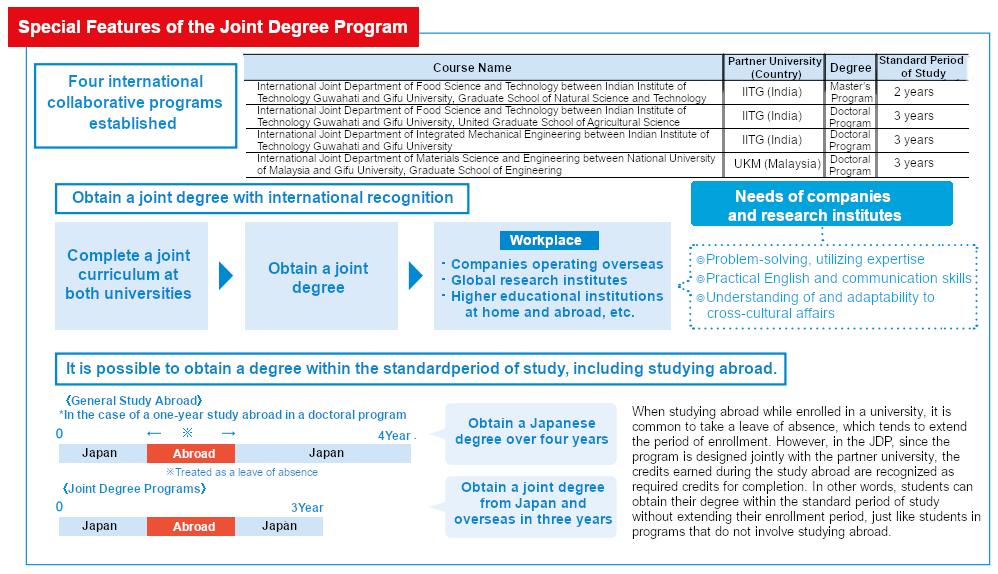
Developing human resources to produce professionals capable of assuming successful roles on the global stage

to local companies: Visit to Taiyo Kagaku
Co., Ltd.
Students enrolled in the JDP are required to experience studying abroad for a designated period of study. At the host university, they are treated as local students, trained in language and communication skills, and educated in a world-class faculty in their field, to internationally accepted degree standard. In research, each student has academic supervisors both in Japan and overseas, capitalizing on the strengths of each supervisor to forward their research through synergistically exploiting new technologies and ideas. The greatest benefit is the hands-on experience of collaborating in a different culture. Students returning from study abroad often look different and say things like, 'I realized that my common sense is not universal.' Companies that have employed JDP students highly value their experience in collaborating with local students., and these students often play leading roles in companies doing business with India. I hope that current and future students will experience working with people from different cultures, heighten their awareness of their own perspectives, and gain confidence in their abilities.


Interaction between IITG and Gifu University featured
in a Japanese government overseas promotional video
(View the video here.)
In addition to the JDP, in the 2022 academic year, Gifu University's proposal was selected for MEXT's 'Inter-University Exchange Project: Support for Creation of Inter-University Exchanges in the Indo-Pacific Region.' To develop human resources capable of addressing local issues from a global perspective, we launched the 'Glocalist' (undergraduate level) and 'Glocal Expert' (master's and doctoral levels) programs, for which international joint certificates are awarded. Similar to the JDP, these are joint programs with IITG and UKM, but such cross-border collaborations are expanding beyond the research fields of JDP majors. We will continue to develop programs that not only enhance expertise but also foster the ability to adapt to and collaborate with different cultures.
Voice from JDP Students


Mr. Shunta Goto
At IITG, I studied a wide range of subjects, including membrane engineering and advanced food engineering. I attended lectures with local students and struggled to keep up with the unfamiliar English and fast pace, so I studied hard, never skipping preparation and review. The nights before exams, I stayed in the university library, which was open 24/7, and studied all night with local students. During the five-month study abroad, I was able to focus on research for only about one month; balancing lectures and research was challenging. Even with my poor English, people tried to understand me, and I became able to speak without hesitation. Every day brought new discoveries, with events that would be unimaginable in Japan.

Experiencing diverse cultures, religions, environments, and people allowed me to feel India's growth firsthand.

Mr. Muhamad Eqmal Izman Bin Mohd Fadli
 I came to Japan from Malaysia to complete my research under the supervision of Professor Masato Ikeda and Professor Lim Lee Wah. I deepened my knowledge mainly in the synthesis of supramolecules, electrochemistry, chromatography, biosensor development, and the use of FTIR, 1H-NMR, and UV-Vis instruments. When I first arrived at Gifu University, my supervisor and lab members held a welcome party for new students, and the food served was very delicious. Gifu University provides financial support through the Research Assistant system and assists with purchasing the necessary chemicals and equipment for research. My Gifu University student tutors helped me with opening a bank account and dealing with city hall matters. In the future, I would like to become a lecturer in Malaysia, utilizing what I learned at Gifu University.
I came to Japan from Malaysia to complete my research under the supervision of Professor Masato Ikeda and Professor Lim Lee Wah. I deepened my knowledge mainly in the synthesis of supramolecules, electrochemistry, chromatography, biosensor development, and the use of FTIR, 1H-NMR, and UV-Vis instruments. When I first arrived at Gifu University, my supervisor and lab members held a welcome party for new students, and the food served was very delicious. Gifu University provides financial support through the Research Assistant system and assists with purchasing the necessary chemicals and equipment for research. My Gifu University student tutors helped me with opening a bank account and dealing with city hall matters. In the future, I would like to become a lecturer in Malaysia, utilizing what I learned at Gifu University.

Ms. Yurino Shimizu
I decided to study abroad to acquire international communication skills and the ability to set and solve problems from different perspectives. Learning with local students not only stimulates academic growth but also fosters a glocal perspective that transcends countries and regions. By handling the challenges of studying abroad on my own, I have strengthened my problem-solving skills and independence. I have had the opportunity to learn comprehensively across multiple fields, gaining a deep understanding of the unique ways of thinking, customs, and cultures of Indian people. I would like to incorporate these new perspectives and ideas into my studies and career in the future.

The expectations and anxieties about studying abroad are best addressed by experiencing them firsthand. I believe that the encounters I have had while studying abroad have expanded my confidence and possibilities for the future.
